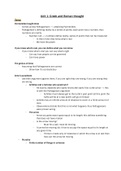Interview
HZT4U: Grade 12 University Philosophy Complete Notes
- Course
- Philosophy
- Institution
- 4
All the notes up to Unit 5 of the curriculum. If you have any questions or need any extra readings I can provide them with the document, just leave a message.
[Show more]



